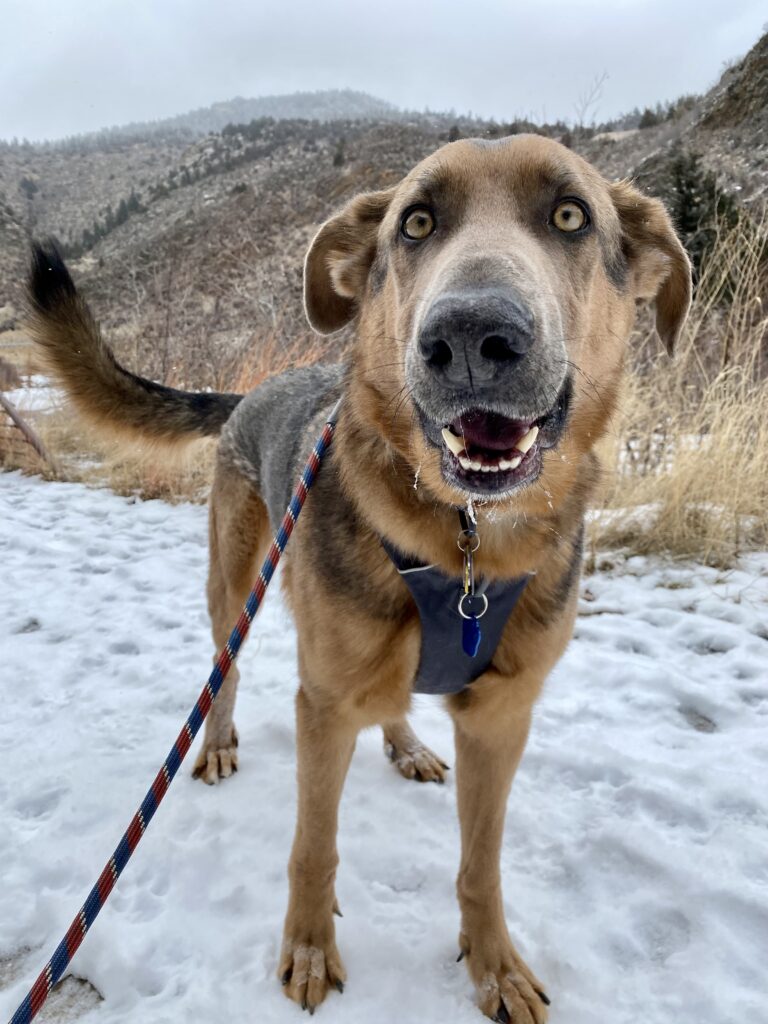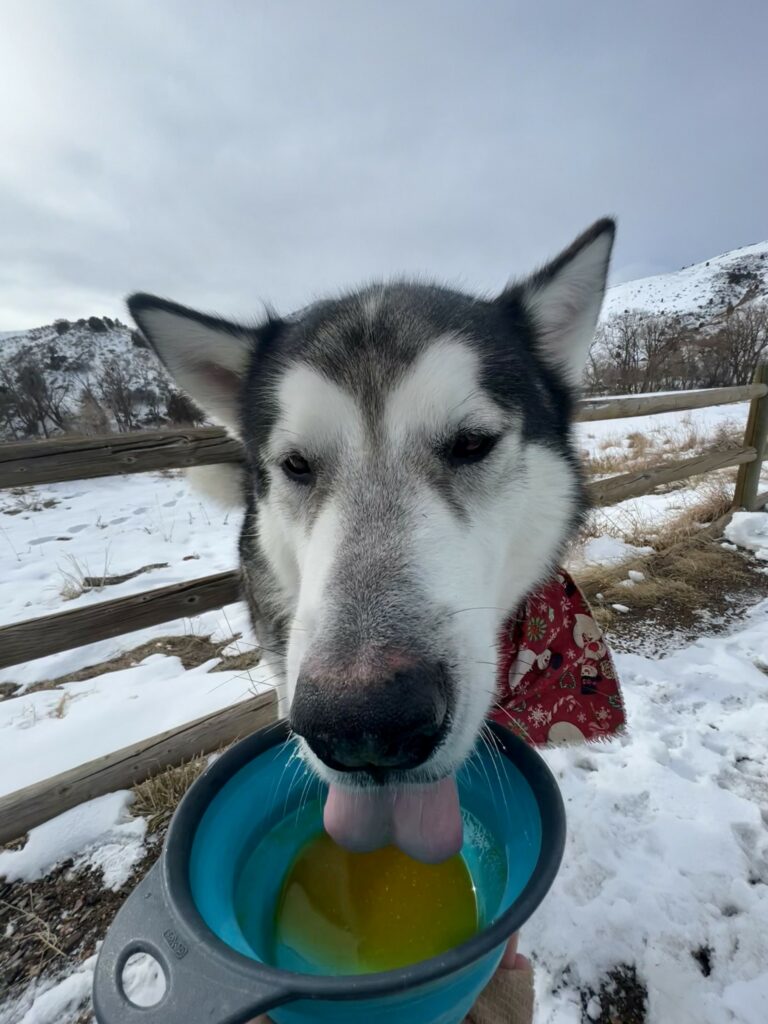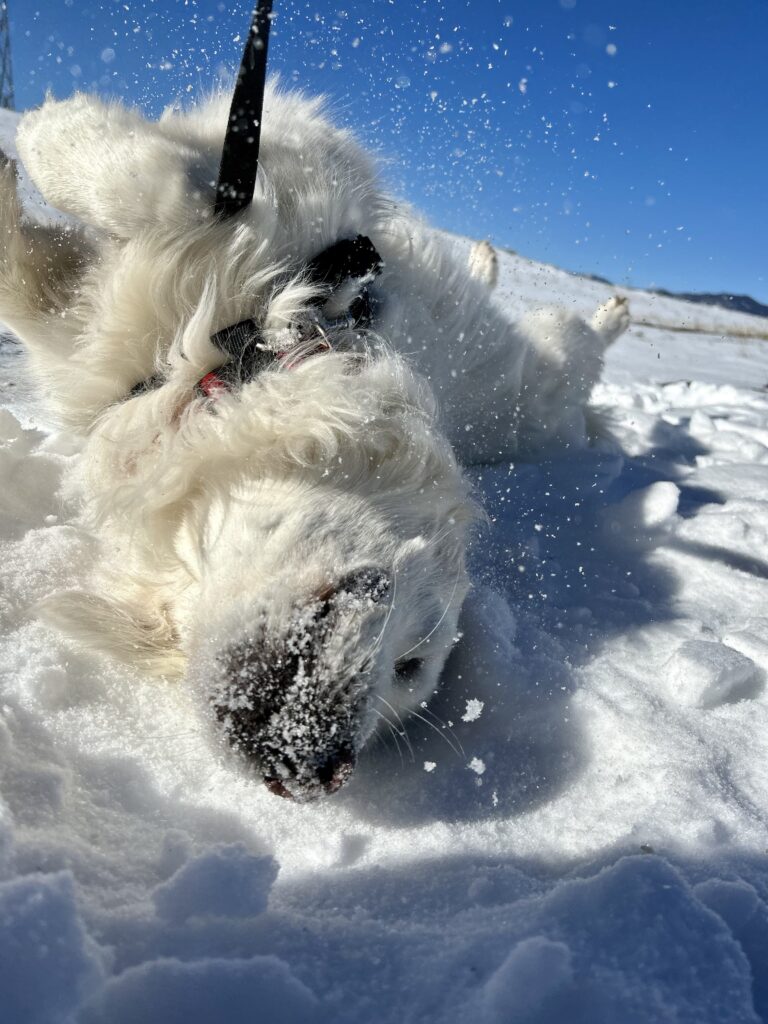










Winter hiking in Colorado with dogs offers breathtaking landscapes and peaceful solitude, and what better way to enjoy it than with your loyal four-legged friend? However, with the beauty of winter trails comes the responsibility of ensuring your dog’s safety and well-being in challenging conditions. In this guide, we’ll explore essential winter safety tips to keep your canine companion safe and happy on the trail.

When venturing out on a winter hike with your dog, the right gear will make all the difference. You do not want to find yourself out on the trails without the proper gear.
Always check the weather forecast and trail conditions before embarking on a winter hike. Colorado’s weather can be unpredictable, and conditions can change rapidly. Extreme cold can be dangerous for your dog, so avoid hiking on days when temperatures plummet. Be mindful of heavy snowfall, as deep snow can be exhausting for dogs, especially smaller breeds. Choose trails with manageable snow levels for your dog’s size and stamina. Always be aware of avalanche warnings and steer clear of hazardous terrain.
Always have a Plan B. Expect in the winter that your original plan will not always be available. Sometimes trailheads close unexpectedly in the winter, or the snowfall will be deeper than anticipated when you get there.
Frostbite and hypothermia can affect dogs just as they can humans. It is important to know the signs and how to prevent them. Frostbite may manifest as pale or grayish skin, cold and firm tissue, or blistering. Pay special attention to your dog’s ears, nose, and paws. Hypothermia can result in shivering, lethargy, weakness, and slow movements. In severe cases, confusion or unconsciousness. To prevent these conditions, keep your dog warm with appropriate clothing, limit their exposure to extreme cold. Ensure they have shelter if needed. Additionally, dry your dog thoroughly after any wet activities.
VCA Animal Hospital has an extremely helpful article on Frostbite in Dogs that I would recommend taking a look at!

In cold weather, it can be easy to overlook hydration. However, it is crucial to keep your dog well-hydrated and fueled. Be sure to carry enough water for both you and your dog, and pack high-energy snacks to keep their stamina up during the hike. Be aware that many available water sources, such as lakes, ponds, and rivers, may be frozen or inaccessible during winter.
Eating snow is NOT a sufficient replacement from drinking water. In fact, you should try and discourage your dog from eating ice or snow directly from the ground, as it can lower their body temperature.
Responsible dog ownership on the trail helps maintain a safe environment for everyone. Be aware of leash laws in your hiking area, as Colorado has leash laws in many regions. Always obey these regulations to ensure the safety of your dog and other hikers.
Winter hikes may bring encounters with wildlife seeking food or shelter. Keep your dog leashed to avoid confrontations, ensuring the safety of both your dog and local wildlife. If you want additional tips for keeping your dog safe around wildlife, check out these Hiking With Dog Wildlife Encounter Tips.
Imagine yourself going on a winter hike and NOT wearing boots?! Protecting your dog’s paws is essential for their comfort and safety. Consider using dog boots to shield their paws from the cold ground, ice, and sharp objects on the trail. Additionally, be extremely cautious around frozen lakes or ponds, especially in the early winter months. Always test ice thickness before allowing your dog to walk on it, thin ice can lead to terrible accidents.
Consider using Mushers Secret or other paw wax to help protect their paws. Mushers Secret not only helps with their paws, but it also helps prevent snowballs that dogs with curly or long fur can get in the snow.
Being prepared and connected is crucial when hiking with your dog. Ensure your dog has a well-fitted collar with an ID tag and a microchip with up-to date contact information.
Carry a fully charged cellphone for emergencies and have a map of the trail on hand. It is also good practice to communicate your hiking plans with someone who isn’t joining the hike, providing an extra layer of safety. Have a check in time and make sure they know where you plan on hiking!

Winter hiking with dogs in Colorado can be an unforgettable experience, full of beauty and adventure. However, ensuring your fur babies’ safety and happiness is crucial. By following these winter safety tips and being prepared for any challenge, you can enjoy the beauty of Colorado’s winter trails while keeping your pup safe, warm, and having fun.
Remember that every dog is unique, so make sure to adapt these tips to suit your individual pup’s abilities and likes. With the right gear, knowledge, and care, your winter hikes can be rewarding for both of you. Stay safe, and enjoy the wonders of the winter wilderness together.

All Hike Doggies must meet the following requirements to ensure all our doggies remain safe and have an awesome hike:
If your doggie does not meet these requirements, we recommend neutering/spaying (if you are not planning on breeding your cutie) & do targeted training in any area where he/she may need some help so they can enjoy an enriched lifestyle full of outdoor fun with friends!